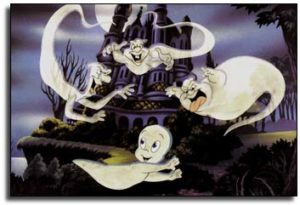
I was recently asked if I believe in, or if I believe there could be such a thing as a benevolent ghost. I think essentially this question means; do I believe there are good ghosts?
This is a more complicated question than you might think. To answer this, one must first decide what ghosts are, at least to their own mind and sensibility. While there are many schools of thought on this particular subject, what matters is the opinion of the person bearing the question, but for the sake of argument we might consider some of the popular ideas.
The three main types of ghosts, that is, the three main kinds of situations in which people tend to experience what they believe are ghosts, are residual hauntings, apparitions or spectres, and poltergeist type hauntings.
Each type has it’s own characteristics, which are typically used as a primary means to identify that type in the course of an investigation, though only the latter two are capable of maintaining any emotional polarity, as might be identified by the person experiencing the event.
In other words, residual hauntings are analogous to a video playback loop, with no sentience or intrinsic intelligence. Any qualities of personality in this kind of haunting are difficult to assign a label of good or evil too, in the same way that a video recording is neither good or evil.
Apparitions and spectres, and poltergeist are unique in that they appear to possess a will and/or purpose, though not necessarily intelligence per se. This will is what allows us to anthropomorphically assign a moral value to its behaviour or actions, and thus label the entity either good or evil.
Now, all of this may give the impression that I lack any belief in ghosts, specifically in apparitions and poltergeist, though nothing could be further from the truth. In my experience I have witnessed full form apparitions, I have experienced real world interference and effects from their actions and have heard and analysed testimony from multiple Mediums who were, at various times, able to confirm my own interpretations of the events as I experienced.
In particular, I was exposed to the presence of an apparition at my previous address, this ghosts is believed to be the spirit of an older generation Portuguese woman. The details of the many encounters that were experienced at that location, by my entire family and by many friends, colleagues and acquaintances, are of no consequence to the question at hand; except to say that never once was any witness to her appearance, behaviour or effects frightened by the experience. This would quite clearly suggest that, at least in this instance, the spirit in question was far from malevolent. She did not interfere with our enjoyment of the home, and on more than one occasion she showed genuine concern for the emotional troubles of myself and my wife.
This of course is not offered as evidence of her existence, or of any other ghost for that matter, but takes us a step further toward answering the question. The initial question, whether or not I believe in benevolent ghosts, is sufficiently answered, but the second is not completely satisfied.
The mere mention of the word “poltergeist” often incites feelings of fear and unease; the typical characteristics of a poltergeist event are shrouded in anger, manipulation and malice, and in some cases can become dangerous to witnesses. On the surface this would suggest an inherent malevolence in the entity behind the event, and while I might agree to a certain extent, I would propose that there is a more human explanation.
With certain exceptions, what we mean when we label something as a ghost, whether that entity or event is classified as a residual haunting, an apparition or a poltergeist, is that there is a spiritual entity present, which is exerting its influence on our environment. The nature and origin of that entity remain debatable, but most agree that they are, or were human spirits at some point in the past.
If we can, even loosely, agree that this is the nature of the ghost, then our answer is already present. No ghost, no matter the scope, scale or style of its influence on our environment, is specifically good or evil, it is human. And as much as there is both the capacity for good and evil in every human, it stands to reason that there remains that capacity in the ghostly spirits we encounter in the hereafter.
In my usual effluent style, I have clumsily come around to what seems to be the reasonable conclusion, though there will be those who argue. To those people I would suggest, that what appears to be one thing in our experience, is often something entirely different in someone else.
